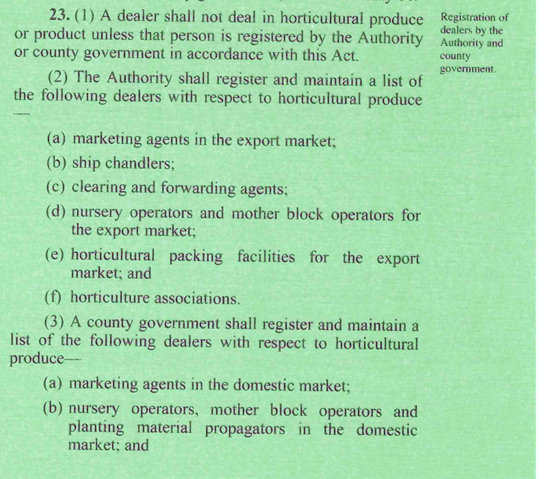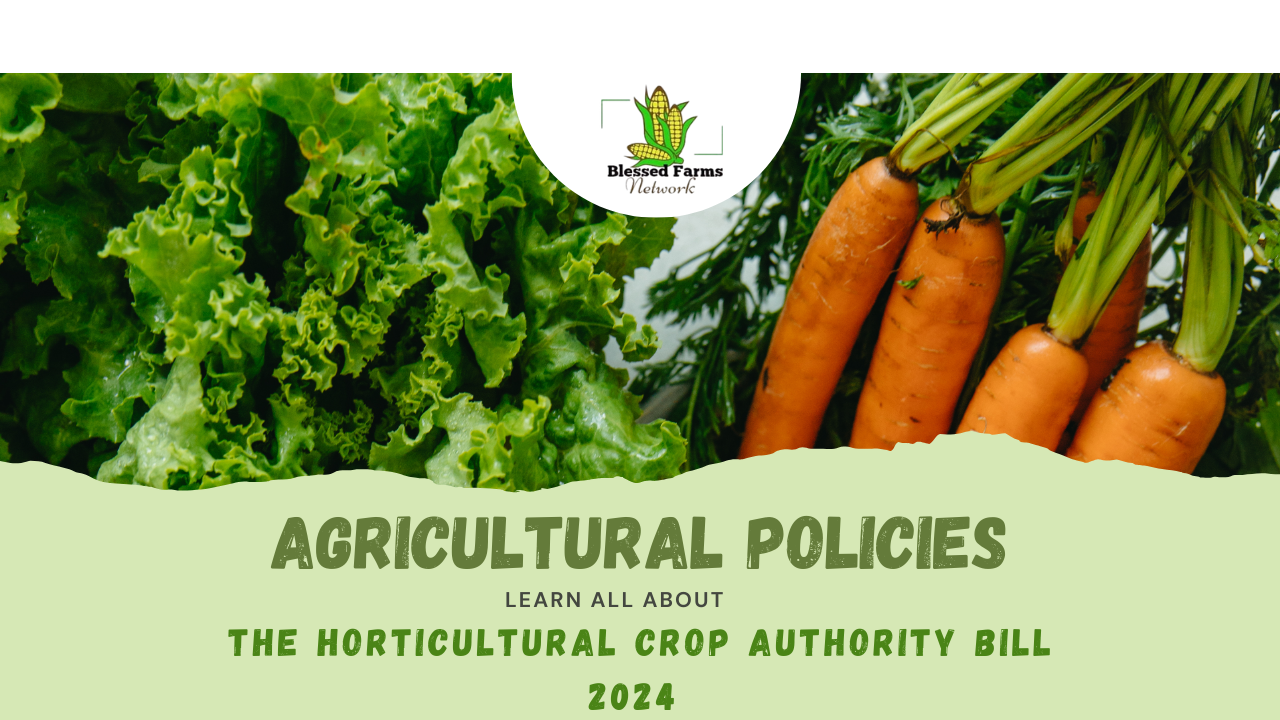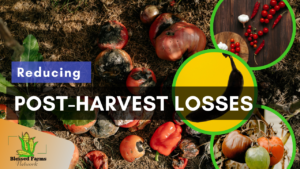Introduction
During his election campaign, President William Ruto emphasized that agriculture would be a key priority for his administration. Since taking office, there have been noticeable changes in the sector. However, some argue that these changes seem to favor large-scale farming and multinational corporations, rather than supporting small-scale farmers. This debate has gained further momentum with the introduction of the Horticultural Crop Authority Bill 2024, which is seen by some critics as another step toward centralizing control of the agricultural sector, potentially disadvantaging smallholder farmers who rely on horticulture as their primary source of livelihood.
You might ask, what is the Horticultural Crop Authority Bill 2024?
And what is wrong with promoting large-scale farming in the country?
Well, let me explain.
What is the The Horticultural Crop Authority Bill 2024?
The Horticultural Crop Authority Bill 2024 is a private member bill proposed by nominated MP Sabina Chege. The Ministry of Agriculture was quick to detach itself from the bill, stating that it had no input in the writing of the bill. The bill seeks to overhaul how horticultural crops like fruits, vegetables, and flowers are cultivated, processed, and marketed. It introduces a licensing system that will require anyone involved in horticulture—from farmers to dealers and marketers—to register with county governments to allow legitimate participation in the value chain. Apparently, this bill is supposed to be part of a broader push by Ruto’s government to introduce reforms aimed at strengthening Kenya’s agricultural sector.
As per the proposition for the bill, it is positioned as a way to improve quality and compliance with international standards, thus allowing large-scale farmers to easily export their produce. But this would only be a nice initiative if there weren’t a large gap between large-scale producers, who primarily serve export markets, and small-scale farmers, who supply local markets.
Currently, in Kenya, small-scale farmers are the driving force behind the thriving agriculture that contributes 20% of the country’s Gross Domestic Product (GDP) and employs over 40% of the population. This number is even higher in rural communities, accounting for about 70%. With around 7.5 million smallholder farmers in Kenya, they produce 80% of the country’s agricultural output, working on land sizes ranging from one to five acres. As the larger portion of the two, it is only fair that the policies should contribute significantly to their growth, rather than completely removing them from the farming equation.
How The Horticultural Crop Authority Bill 2024 Affects Small-Scale Farmers
One of the main concerns with The Horticultural Crop Authority Bill 2024 is its licensing requirements. While it aims to improve traceability, safety, and market access, it could also create barriers for small-scale farmers, who are less equipped to navigate complex regulatory frameworks. For instance, the Bill mandates that farmers must obtain licenses for cultivation, handling, and selling horticultural products—activities that many small farmers currently carry out informally.
While the Agriculture and Food Authority (AFA) has stated that the Bill primarily targets large-scale players and exporters, it’s hard to ignore the potential impact on smallholders. Obtaining licenses and complying with county-level registration could prove costly, particularly for farmers in rural areas. Additionally, there’s a risk that small-scale farmers who cannot meet these new regulatory demands will be pushed out of formal markets, making it harder for them to compete.
According to Dr. Andrew Kamau, the Cabinet Secretary for Agriculture, the bill contains several punitive measures that could disproportionately affect farmers, particularly smallholders.
Let’s break this down:
1. Introduction of Licensing System
According to the Horticultural Crop Authority Bill 2024, all participants in the horticulture value chain, whether small-scale or large-scale farmers, are required to register with their county government. Based on past experience, this could lead to bureaucratic hurdles and added costs that small-scale farmers may find difficult to manage. A key challenge for small-scale farmers is their limited access to credit, which forces them to constantly seek ways to reduce their production costs. This bill may be counterproductive for them, as it increases their operational costs without guaranteeing higher production or better market access.
It would make more sense to first empower small-scale farmers by providing them with the resources and support needed to increase their production. Once they reach a certain level of output, they could then be required to register. This approach would ensure they have the capacity to meet the requirements of the bill without being burdened by additional costs and bureaucracy from the start.
2. Centralized Oversight
The bill is proposing a centralized regulation and oversight of the horticultural sector through a specific board. This could pose significant challenges for small-scale farmers in Kenya, particularly if the regulatory standards are tailored more to the needs of large-scale operators. Many smallholders may struggle to meet these stringent requirements due to limited resources and access to technology, potentially jeopardizing their livelihoods.
Additionally, the high rates of corruption within county governments can exacerbate these challenges, as small farmers might face bribery or favoritism that disadvantages them further in obtaining necessary permits or assistance. Furthermore, the lack of fully functioning systems in many county governments can lead to inconsistent enforcement of regulations, creating confusion and hindering compliance efforts among small-scale farmers.
An alternative approach would be to empower current field agricultural officers to provide direct support to farmers. Establishing a centralized system for training and education could enhance farmers’ understanding of the required standards, leading to improved compliance. This, in turn, would boost agricultural output and increase profits for the farmers.
3. Marketing Channels
A large part of the horticulture sector consists of small-scale farmers who sell their produce in local markets, often informally. It’s important to understand that vegetables like sukuma (kale), cabbage, carrots, and other crops you find at your local green-grocer are classified as horticultural products. These crops will be affected by the Horticulture Bill.
What does this mean?
It means that, according to the bill, (As seen in the images below) even Mama Mboga, your local green-grocer, will be required to get a license to sell her produce. Think about that. The woman who wakes up before dawn, travels to the market, and brings fresh vegetables to your doorstep will now have to navigate a complicated system just to keep her small business alive.
Licensing, registration, and all the paperwork that comes with it—does Mama Mboga have the resources, time, or knowledge to manage that? Further, this licensing is not a one-time thing, rather it is a yearly process. This bill isn’t just a bureaucratic shift. It’s a threat to the livelihoods of thousands of small-scale farmers and traders who form the backbone of our local food system.
It risks pushing them out of the market. And what happens then? Higher prices at your local market, fewer choices, and the possibility that many hardworking families will lose their only source of income. Are we ready to sacrifice the informal traders who keep our local markets vibrant and affordable?


Based on this, it’s clear that the Horticultural Crop Authority Bill 2024 contains punitive measures. It is not aimed at improving the lifestyle of over 70% of the country. Smallholder farmers are the backbone of Kenya’s agriculture. They account for more than 80% of our agricultural output, playing a critical role in national food security.
These farmers produce the majority of the staple foods we rely on every day—maize, beans, sukuma, and vegetables. They ensure that even the most vulnerable communities have access to affordable and nutritious food. Without them, prices would skyrocket, and access to fresh, affordable produce would become a luxury, not a basic need.
So why is the bill threatening the very people who are keeping food on our tables?
This underscores the need for policies that uplift small-scale farmers, not push them out. Instead of overwhelming them with unnecessary regulations, we should be focusing on how to support their efforts. These are hardworking men and women who rely on the flexibility of the informal markets to survive. They don’t need licenses—they need support, training, and fair access to markets.
If we continue down this path, we risk not only losing their contributions to our food system but also endangering the livelihoods of millions. This is not just a policy issue; it’s a matter of survival for many Kenyan families.
Impact on Large-Scale Farmers and Multinational Corporations
Large-scale farmers are in a completely different position when it comes to this bill. They have the resources to absorb the costs of licensing and other compliance requirements. With their access to larger capital, they can hire consultants, navigate the paperwork, and meet all the regulatory demands without breaking a sweat. For them, this bill is just another hurdle they can easily jump over. In fact, it may even work in their favor by reducing competition from small-scale farmers who can’t afford to meet these new standards.
Now, let’s talk about multinational corporations. They stand to gain the most from this legislation. The formalization of the horticultural value chain makes Kenya’s agricultural sector more appealing to foreign investors. These corporations, with their vast resources, can navigate stricter licensing rules and use their influence to dominate the market. They will have no trouble complying with international standards and will seize the opportunity to expand their hold on export markets.
For multinational companies, the Horticultural Crop Authority Bill 2024 could turn Kenya’s agriculture into a goldmine. The bill creates stability and reliability in the sector, attracting even more foreign players. Meanwhile, small-scale farmers, who have been feeding local communities for years, will be squeezed out, unable to keep up with the mounting regulations and costs. This bill, instead of supporting Kenyan farmers, seems designed to benefit the few who already have the upper hand. It will further increase the divide between the haves and the havenots.
Recommendations for More Inclusive Agriculture Policies
While Ruto’s government is right to focus on improving Kenya’s agricultural sector, it’s crucial that any reforms take into account the needs of small-scale farmers. Instead of imposing burdensome licensing requirements, the government could introduce measures that support smallholders in accessing formal markets. For example:
- Do Away with Licensing Fees: The government could completely remove the licensing fee for small-scale farmers who are selling their produce locally. The fee should only apply to those farmers looking to export their products. This way, smallholders who rely on local markets aren’t forced to pay extra just to stay in business.
- Technical Support: Many small-scale farmers lack the resources to understand and navigate complex regulatory processes. The government, along with NGOs, could step in to provide technical support, helping smallholders meet the necessary standards without overwhelming them. This could include training, guidance, and access to the right tools to ensure they comply with the regulations smoothly.
- Market Access Initiatives: The government could also introduce programs aimed at improving small-scale farmers’ access to both local and export markets. By connecting smallholders with buyers and offering support with packaging, transportation, and marketing, the government can ensure that these farmers aren’t left behind as the horticultural sector becomes more formalized.
These changes would make The Horticultural Crop Authority Bill 2024 more inclusive, ensuring that small-scale farmers can continue to thrive alongside large-scale producers. Smallholders have played a crucial role in Kenya’s agriculture for decades, and any reform should prioritize their growth and success.
Conclusion
The Horticultural Crop Authority Bill 2024 has the potential to transform Kenya’s horticultural sector, bringing much-needed oversight and regulation. However, it must be implemented in a way that supports—not hinders—small-scale farmers. By adopting more inclusive agriculture policies and working with stakeholders, Ruto’s government can create a horticultural industry that benefits everyone, from large-scale exporters to the smallholder farmers who form the backbone of Kenya’s agricultural economy.
For Kenya’s horticultural sector to thrive, the focus must be on creating a balanced regulatory environment that promotes growth while ensuring that small-scale farmers are not left behind. The future of Kenya’s agriculture depends on it.






I found your article through a friend’s recommendation.It’s great! Here’s something similar I wrote.